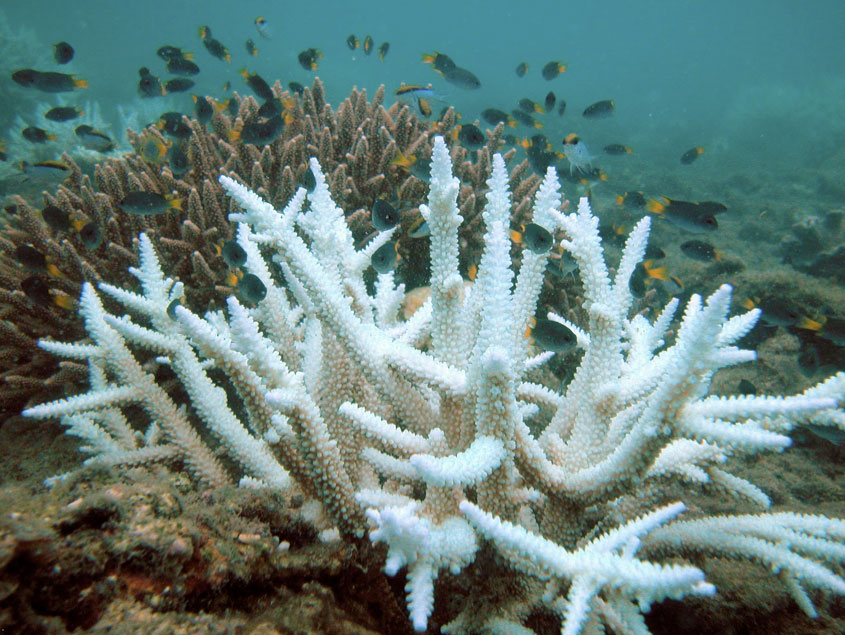Increasing Ocean Acidification Invading Marine Life!

Greetings! In some of my previous blogs, I’ve been talking about the extremely harmful effects of ocean acidification. Ocean acidification occurs as the result of greenhouse gases [carbon dioxide – CO2] created from human activity, being released into the air. The oceans act like a giant sponge and they soak up a good deal of CO2 in the atmosphere. However, this process makes our oceans more and more acidic, which lowers its pH.
The pH is a figure scientists use in measuring the acidity or alkalinity of a solution is. In pH measurement, 7 is neutral. Any number below 7 is acidic; any number above 7 is alkaline. So as more and more carbon dioxide is released into the air, the more acidic oceans become.
New writing in Scientific Reports explains, “Carbon dioxide emissions are killing off coral reefs and kelp forests as heat waves and ocean acidification damage marine ecosystems. Researchers say that three centuries of industrial development have already had a marked effect on our seas. If CO2 levels continue rising in our atmosphere and ocean, lower pH readings could potentially have a catastrophic impact.”
The report is from a study of the effects of newly discovered volcanic CO2 seeps (also known as CO2 vents) found off of Shikine Island, Japan. This region is “on the border of temperate and tropical climates.”The scientists report that, “Ocean currents in the area are naturally low in levels of surface water CO2, similar to those that would have been present before the global Industrial Revolution.” The report continues and explains these volcanic seeps show how “rising CO2 levels will affect future ecology, both in the northwest Pacific Ocean and across the world.”
The lead author of the research report, Dr. Sylvain Agostini, Associate Professor at the University of Tsukuba Shimoda Marine Research Center said,“These CO2 seeps provide a vital window into the future. There was mass mortality of corals in the south of Japan last year, but many people cling to the hope that corals will be able to spread north. Therefore it is extremely worrying to find that tropical corals are so vulnerable to ocean acidification, as this will stop them from being able to spread further north and escape the damage caused by water that is too hot for them.”
This research was conducted by scientists at the University of Tsukuba in Japan, the University of Plymouth in the United Kingdom and the University of Palermo in Italy. There were teams of scuba divers who studied the underwater CO2 gradients, which were created by volcanic seeps. They recorded on how the fauna and flora dealt with ocean acidification. They reported, “While a few plant species benefitted from the changing conditions, they tended to be smaller weeds and algae that blanket the seabed, choking corals and lowering overall marine diversity.These species, and some smaller marine animals, are thriving because they are more tolerant to the stress posed by rising levels of CO2.”
Jason Hall-Spencer, Professor of Marine Biology at the University of Plymouth, explained, “Our research site is like a time machine. In areas with pre-industrial levels of CO2 the coast has an impressive amount of calcified organisms such as corals and oysters. But in areas with present-day average levels of surface seawater CO2 we found far fewer corals and other calcified life, and so there was less biodiversity. It shows the extensive damage caused by humans due to CO2 emissions over the past 300 years and unless we can get a grip on reducing CO2 emissions we will undoubtedly see major degradation of coastal systems worldwide.”
Professor Kazuo Inaba, former director of the Shimoda Marine Research Centre, said, “Local fishermen are keen to know how ocean acidification will affect their livelihoods. Currents flowing past Japan bring waters that have naturally low levels of CO2 and fish benefit from the array of calcified habitats around our islands. If we are able to meet the Paris Agreement targets to limit emissions we should be able to limit further damage to kelp forests, coral reefs and all marine ecosystems.”
If you are in Florida and you see a sick or injured manatee, please call the Florida Fish and Wildlife Conservation Commission at: 1-888-404-FWCC. They are the folks who are responsible for rescuing us in Florida.
Here’s the Save the Manatee Club link to learn more about us manatees …
Here’s a cool link for you to learn more about how we’re rescued and brought into rehabilitation …
~ Kobee Manatee
Related Posts
The Climate Change Invasion on our Precious Coral Reefs (August 3, 2017)
UNESCO – Its Paramount Role in Ocean Acidification Awareness, (January 8, 2016)
Ocean Acidification Unleashes its Fury on West Coast (June 22, 2017)
Could Climate Change Wipe Out Coral Reef Fish? (November 8, 2017)